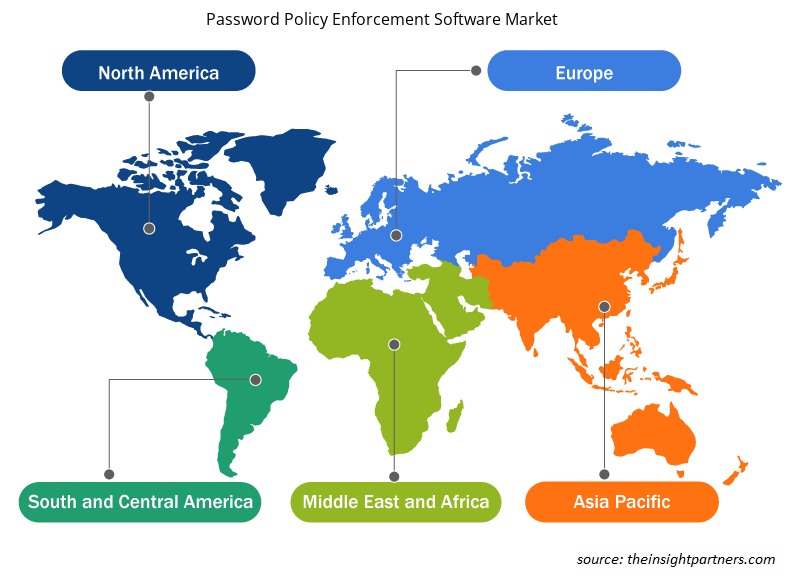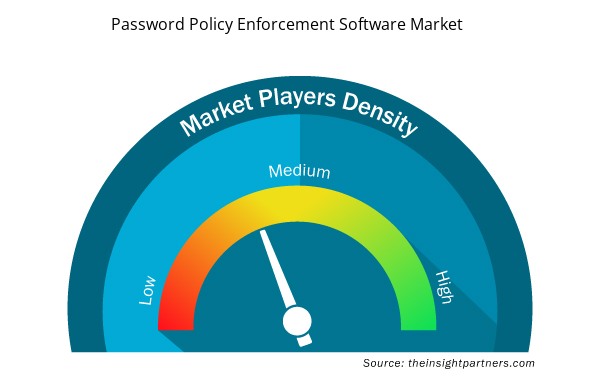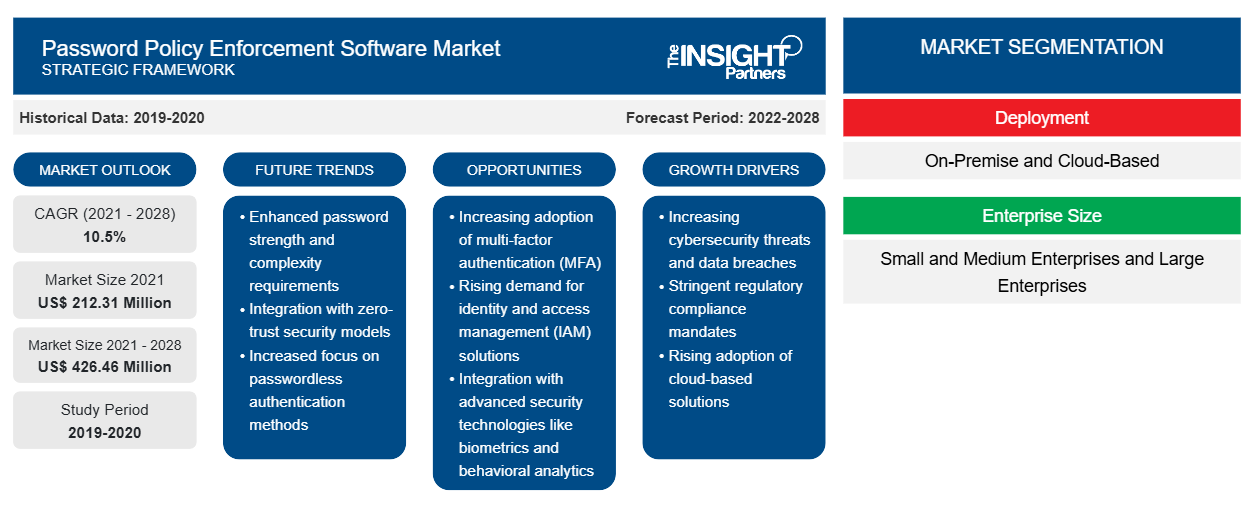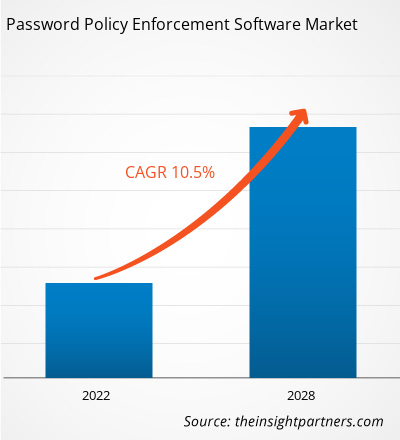2021 年密码策略执行软件市场价值为 2.1231 亿美元,预计到 2028 年将达到 4.2646 亿美元。预计 2021 年至 2028 年的复合年增长率为 10.5%。
密码策略实施软件解决方案可确保在公司的所有平台上使用强密码。组织安装密码策略实施软件,以使相关用户创建符合公司密码策略限制的密码,这些限制包括密码复杂性、符号、数字、大小写字母、字符最小值和最大值。这些限制还确保密码不包含常用单词、短语或密码、公司指定的黑名单单词或来自已知黑客词典的密码。
多家数字供应商已进入密码策略实施软件市场,为各个垂直行业提供简化的产品。例如,Netwrix Corporation 提供简化的密码策略实施软件,该软件允许用户、域组和组织单位指定最多 256 条本地和域密码规则,从而满足最复杂的密码策略需求。
北美是密码策略执行软件市场最重要的市场之一。此外,分析、云和 BYOD 趋势等领域技术的不断改进预计将为该地区市场提供巨大推动力。此外,网络攻击频率的增加引发了人们对密码安全的担忧,从而推动了密码策略执行软件市场的增长。
定制此报告以满足您的需求
您可以免费定制任何报告,包括本报告的部分内容、国家级分析、Excel 数据包,以及为初创企业和大学提供优惠和折扣
- 获取此报告的关键市场趋势。这个免费样品将包括数据分析,从市场趋势到估计和预测。
COVID-19 疫情对密码策略执行软件市场的影响
SARS-CoV-2 的大规模传播促使各国政府对车辆和人员的流动实施严格限制。各国政府随后颁布的旅行禁令、大规模封锁和企业停工影响了各国的经济和行业,尤其是在 2020 年。封锁措施还减少了商品、货物和服务的生产。相反,COVID-19 大流行促进了 2020 年密码策略实施软件市场的增长,因为公司要求数百万员工远程工作。遵循这些标准保护措施导致第三方网络、数字平台和个人计算设备的使用量增加。这种网络连接解决方案增加了数据泄露和其他恶意软件的风险。由于网络犯罪风险增加,企业寻求密码策略实施软件来检测和管理网络中的任何异常行为。
市场洞察 – 密码策略执行软件市场
密码策略执行软件市场的进步
尽管替代身份验证方法的趋势日益增长,但密码正在找到一种“共存”的解决方案,并且在可预见的未来,密码是必不可少的。在可以轻松部署复杂的解决方案之前,现有密码必须补充更新的标准,例如生物识别和多因素身份验证。密码不够强大,无法独立存在,但这并不会影响其在安全性方面的重要性。因此,即使密码即将被淘汰,企业也应该坚持自己的政策,确保员工遵守密码卫生习惯。密码用于访问技术。由于 Apple 的 Touch ID 等技术,无密码运动已达到技术临界点:技术在进步,客户已经为生物识别身份验证做好了准备。无密码设置的好处不仅限于物理形式因素。用户可以使用面部、触摸或声音来识别自己,但系统现在可以包含空间标识符。行为分析更难被破解,对用户来说也不那么不方便。
此外,当实施新的安全系统时,用户总会对不熟悉或认为需要额外花费的情况做出负面反应。然而,双因素和多因素身份验证正变得越来越流行,并且它们为使用它们的人带来了回报。因此,密码策略执行软件的进步预计将在不久的将来推动密码策略执行软件市场的增长。
基于部署的见解
根据部署类型,密码策略执行软件市场可分为本地部署和基于云的部署。在当今的企业 IT 世界中,在决定云基础设施是否完美契合之前,需要考虑许多因素。另一方面,许多企业无法过渡到云,而是依靠久经考验的传统和本地部署系统和软件来开展业务。
基于企业规模的洞察
根据企业规模,密码策略执行软件市场分为中小型企业和大型企业。中小企业 (SME) 是指收入、资产或人员低于特定门槛的公司。各国对中小企业 (SME) 的定义不同。中小企业尽管规模较小,但在经济中发挥着至关重要的作用。它们的数量远远超过大公司,拥有大量劳动力,而且具有创业精神,为创新做出了贡献。
密码策略执行软件市场区域洞察
Insight Partners 的分析师已详尽解释了预测期内影响密码策略执行软件市场的区域趋势和因素。本节还讨论了北美、欧洲、亚太地区、中东和非洲以及南美和中美洲的密码策略执行软件市场细分和地理位置。

- 获取密码策略执行软件市场的区域特定数据
密码策略执行软件市场报告范围
| 报告属性 | 细节 |
|---|---|
| 2021 年市场规模 | 2.1231亿美元 |
| 2028 年市场规模 | 4.2646亿美元 |
| 全球复合年增长率(2021 - 2028) | 10.5% |
| 史料 | 2019-2020 |
| 预测期 | 2022-2028 |
| 涵盖的领域 | 按部署
|
| 覆盖地区和国家 | 北美
|
| 市场领导者和主要公司简介 |
|
密码策略执行软件市场参与者密度:了解其对业务动态的影响
密码策略执行软件市场正在快速增长,这得益于最终用户需求的不断增长,而这些需求又源于消费者偏好的不断变化、技术进步以及对产品优势的认识不断提高等因素。随着需求的增加,企业正在扩大其产品范围,进行创新以满足消费者的需求,并利用新兴趋势,从而进一步推动市场增长。
市场参与者密度是指在特定市场或行业内运营的企业或公司的分布情况。它表明在给定市场空间中,相对于其规模或总市场价值,有多少竞争对手(市场参与者)存在。
在密码策略执行软件市场运营的主要公司有:
- 管理引擎
- 阿瓦捷
- 日立ID系统公司
- Netwrix 公司
- nFront 安全公司
免责声明:上面列出的公司没有按照任何特定顺序排列。

- 获取密码策略执行软件市场顶级关键参与者概述
密码策略执行软件市场的参与者主要致力于开发先进、高效的产品。
- 2021 年,Netwrix 收购了 PolicyPak,以扩展其终端安全产品。此次收购预计将加强 Netwrix 的产品组合,并在未来几年将其对特权账户的安全性和控制扩展到桌面。PolicyPak 和 Netwrix 共同为组织提供针对网络攻击和黑客的安全解决方案。
- 2020 年 9 月,ManageEngine 宣布其 ADSelfService Plus 现在支持多因素身份验证,以保护组织免受任何未经授权的数据访问。
全球密码策略执行软件市场-公司简介
- 阿瓦捷
- 日立 ID 系统公司
- Netwrix 公司
- nFront 安全公司
- safepass.me
- Specops 软件
- Tools4ever(密码复杂性管理器 (PCM))
- Zoho 公司 (ManageEngine)
- JumpCloud 公司
- 恩佐爾。
- 历史分析(2 年)、基准年、预测(7 年)及复合年增长率
- PEST 和 SWOT 分析
- 市场规模价值/数量 - 全球、区域、国家
- 行业和竞争格局
- Excel 数据集



Report Coverage
Revenue forecast, Company Analysis, Industry landscape, Growth factors, and Trends

Segment Covered
This text is related
to segments covered.

Regional Scope
North America, Europe, Asia Pacific, Middle East & Africa, South & Central America

Country Scope
This text is related
to country scope.
常见问题
The global password policy enforcement software market was dominated by the large enterprises segment in 2020. Large enterprises are known to invest in innovative and latest technologies to operate their business effectively. With the growing capabilities of Password Policy Enforcement Software market tools across various industries, adoption of these tools has gained traction over the past few years. Large enterprises are utilizing various analytical tools such as Password Policy Enforcement Software, to effectively streamline the business operations.
The major companies in password policy enforcement software market includes Enzoic; Avatier; Specops Software; Safepass.me; and Zoho Corp (MANAGEENGINE).
In 2020, North America led the market with a substantial revenue share, followed by Europe and Asia Pacific. Asia Pacific is a prospective market for password policy enforcement software market manufacturers.
The global password policy enforcement software market was dominated by the cloud-based deployment segment in 2020. The key element attributed to the segmental growth is the high availability of cloud-based password policy enforcement software to keep vital business systems operating safely despite single component failures. Due to ongoing monitoring, geo-redundancy, and failover mechanisms, the cloud-based data and apps are ready to serve the workforce.
Businesses are progressively implementing security measures such as monitored accounts to improve responsibility. Such shift toward internet-based service offerings is driving the need for password policy enforcement software. Further, the need to comply with tight compliance standards and the rising risk of data theft in the BFSI, healthcare, and public sectors, among others, is further driving the password policy enforcement market.
Rising use of password blacklist or dictionary hack provide the opportunity for the password policy enforcement software solution providers. A well-designed system can check billions of passwords in milliseconds without impacting the user experience. It may also be good to divide the blacklist between passwords that have been disclosed in recent data breaches and those that are regularly found in cracking dictionaries.
Trends and growth analysis reports related to Technology, Media and Telecommunications : READ MORE..
The List of Companies - Password Policy Enforcement Software Market
- ManageEngine
- Avatier
- Hitachi ID Systems Inc.
- Netwrix Corporation
- nFront Security Inc.
- safepass.me
- Specops Software
- Tools4ever
- JumpCloud Inc.
- Enzoic
The Insight Partners performs research in 4 major stages: Data Collection & Secondary Research, Primary Research, Data Analysis and Data Triangulation & Final Review.
- Data Collection and Secondary Research:
As a market research and consulting firm operating from a decade, we have published and advised several client across the globe. First step for any study will start with an assessment of currently available data and insights from existing reports. Further, historical and current market information is collected from Investor Presentations, Annual Reports, SEC Filings, etc., and other information related to company’s performance and market positioning are gathered from Paid Databases (Factiva, Hoovers, and Reuters) and various other publications available in public domain.
Several associations trade associates, technical forums, institutes, societies and organization are accessed to gain technical as well as market related insights through their publications such as research papers, blogs and press releases related to the studies are referred to get cues about the market. Further, white papers, journals, magazines, and other news articles published in last 3 years are scrutinized and analyzed to understand the current market trends.
- Primary Research:
The primarily interview analysis comprise of data obtained from industry participants interview and answers to survey questions gathered by in-house primary team.
For primary research, interviews are conducted with industry experts/CEOs/Marketing Managers/VPs/Subject Matter Experts from both demand and supply side to get a 360-degree view of the market. The primary team conducts several interviews based on the complexity of the markets to understand the various market trends and dynamics which makes research more credible and precise.
A typical research interview fulfils the following functions:
- Provides first-hand information on the market size, market trends, growth trends, competitive landscape, and outlook
- Validates and strengthens in-house secondary research findings
- Develops the analysis team’s expertise and market understanding
Primary research involves email interactions and telephone interviews for each market, category, segment, and sub-segment across geographies. The participants who typically take part in such a process include, but are not limited to:
- Industry participants: VPs, business development managers, market intelligence managers and national sales managers
- Outside experts: Valuation experts, research analysts and key opinion leaders specializing in the electronics and semiconductor industry.
Below is the breakup of our primary respondents by company, designation, and region:

Once we receive the confirmation from primary research sources or primary respondents, we finalize the base year market estimation and forecast the data as per the macroeconomic and microeconomic factors assessed during data collection.
- Data Analysis:
Once data is validated through both secondary as well as primary respondents, we finalize the market estimations by hypothesis formulation and factor analysis at regional and country level.
- Macro-Economic Factor Analysis:
We analyse macroeconomic indicators such the gross domestic product (GDP), increase in the demand for goods and services across industries, technological advancement, regional economic growth, governmental policies, the influence of COVID-19, PEST analysis, and other aspects. This analysis aids in setting benchmarks for various nations/regions and approximating market splits. Additionally, the general trend of the aforementioned components aid in determining the market's development possibilities.
- Country Level Data:
Various factors that are especially aligned to the country are taken into account to determine the market size for a certain area and country, including the presence of vendors, such as headquarters and offices, the country's GDP, demand patterns, and industry growth. To comprehend the market dynamics for the nation, a number of growth variables, inhibitors, application areas, and current market trends are researched. The aforementioned elements aid in determining the country's overall market's growth potential.
- Company Profile:
The “Table of Contents” is formulated by listing and analyzing more than 25 - 30 companies operating in the market ecosystem across geographies. However, we profile only 10 companies as a standard practice in our syndicate reports. These 10 companies comprise leading, emerging, and regional players. Nonetheless, our analysis is not restricted to the 10 listed companies, we also analyze other companies present in the market to develop a holistic view and understand the prevailing trends. The “Company Profiles” section in the report covers key facts, business description, products & services, financial information, SWOT analysis, and key developments. The financial information presented is extracted from the annual reports and official documents of the publicly listed companies. Upon collecting the information for the sections of respective companies, we verify them via various primary sources and then compile the data in respective company profiles. The company level information helps us in deriving the base number as well as in forecasting the market size.
- Developing Base Number:
Aggregation of sales statistics (2020-2022) and macro-economic factor, and other secondary and primary research insights are utilized to arrive at base number and related market shares for 2022. The data gaps are identified in this step and relevant market data is analyzed, collected from paid primary interviews or databases. On finalizing the base year market size, forecasts are developed on the basis of macro-economic, industry and market growth factors and company level analysis.
- Data Triangulation and Final Review:
The market findings and base year market size calculations are validated from supply as well as demand side. Demand side validations are based on macro-economic factor analysis and benchmarks for respective regions and countries. In case of supply side validations, revenues of major companies are estimated (in case not available) based on industry benchmark, approximate number of employees, product portfolio, and primary interviews revenues are gathered. Further revenue from target product/service segment is assessed to avoid overshooting of market statistics. In case of heavy deviations between supply and demand side values, all thes steps are repeated to achieve synchronization.
We follow an iterative model, wherein we share our research findings with Subject Matter Experts (SME’s) and Key Opinion Leaders (KOLs) until consensus view of the market is not formulated – this model negates any drastic deviation in the opinions of experts. Only validated and universally acceptable research findings are quoted in our reports.
We have important check points that we use to validate our research findings – which we call – data triangulation, where we validate the information, we generate from secondary sources with primary interviews and then we re-validate with our internal data bases and Subject matter experts. This comprehensive model enables us to deliver high quality, reliable data in shortest possible time.


 获取此报告的免费样本
获取此报告的免费样本